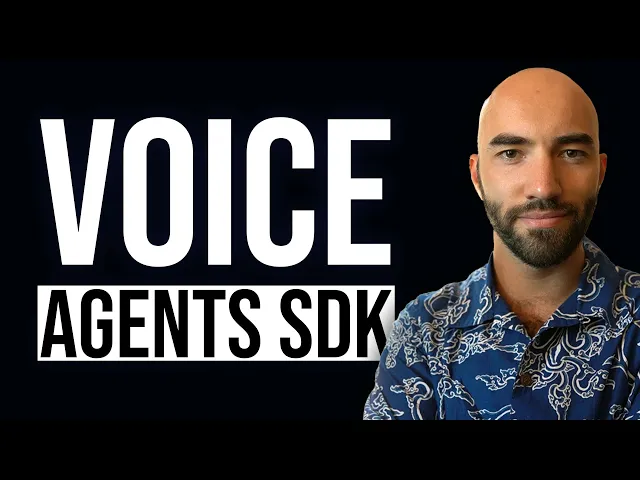AI Voice Assistants with OpenAI’s Agents SDK | Full Tutorial + Code

Building smarter AI voice assistants
The landscape of AI voice assistants is undergoing a remarkable transformation, with OpenAI's Agent SDK emerging as a powerful new toolset for developers. The recent tutorial by AI enthusiast Sahil demonstrates how this technology enables the creation of sophisticated voice assistants capable of handling complex, multi-step tasks while maintaining context across interactions. What makes this particularly exciting is how it bridges the gap between theoretical AI capabilities and practical, usable applications.
Key insights from the demonstration
-
The OpenAI Agent SDK serves as a framework for building persistent agents that maintain conversation history and context, allowing for more natural ongoing interactions compared to traditional single-query systems.
-
By combining OpenAI's assistant API with voice capabilities through technologies like ElevenLabs and Whisper, developers can create voice-based assistants that function similarly to advanced systems like ChatGPT but with additional capabilities.
-
The framework allows for tool integration that enables assistants to perform actions beyond conversation, such as retrieving real-time data or controlling external systems, making them genuinely useful for complex tasks.
Why this matters more than you might think
What struck me most about this development is how it fundamentally changes the interaction paradigm. Traditional voice assistants like Siri and Alexa operate on a question-answer model that requires precise commands and lacks true contextual understanding. The Agent SDK approach creates assistants that can follow a conversation thread naturally, remember previous interactions, and handle multi-step processes without requiring the user to repeat context.
This shift represents a significant leap toward more human-like AI interactions. For businesses, this means the potential to create voice interfaces that customers actually want to use rather than avoid. The frustration of repeating yourself or having to precisely phrase commands could become a thing of the past. Companies that embrace this technology early could gain a substantial competitive advantage in customer experience.
Beyond the tutorial: What's next for business applications
While the demonstration focused on creating a personal finance assistant, the business applications extend much further. Consider customer service scenarios where complex troubleshooting requires multiple steps. Traditional systems force customers to navigate confusing menu trees or repeatedly explain their problem to different departments. An agent built with this SDK could guide a customer through an entire resolution process, maintaining context throughout.
Healthcare represents another promising application space. Imagine a voice assistant that could help patients navigate
Recent Videos
How To Earn MONEY With Images (No Bullsh*t)
Smart earnings from your image collection In today's digital economy, passive income streams have become increasingly accessible to creators with various skill sets. A recent YouTube video cuts through the hype to explore legitimate ways photographers, designers, and even casual smartphone users can monetize their image collections. The strategies outlined don't rely on unrealistic promises or complicated schemes—instead, they focus on established marketplaces with proven revenue potential for image creators. Key Points Stock photography platforms like Shutterstock, Adobe Stock, and Getty Images remain viable income sources when you understand their specific requirements and optimize your submissions accordingly. Specialized marketplaces focusing...
Oct 3, 2025New SHAPE SHIFTING AI Robot Is Freaking People Out
Liquid robots will change everything In the quiet labs of Carnegie Mellon University, scientists have created something that feels plucked from science fiction—a magnetic slime robot that can transform between liquid and solid states, slipping through tight spaces before reassembling on the other side. This technology, showcased in a recent YouTube video, represents a significant leap beyond traditional robotics into a realm where machines mimic not just animal movements, but their fundamental physical properties. While the internet might be buzzing with dystopian concerns about "shape-shifting terminators," the reality offers far more promising applications that could revolutionize medicine, rescue operations, and...
Oct 3, 2025How To Do Homeless AI Tiktok Trend (Tiktok Homeless AI Tutorial)
AI homeless trend raises ethical concerns In an era where social media trends evolve faster than we can comprehend them, TikTok's "homeless AI" trend has sparked both creative engagement and serious ethical questions. The trend, which involves using AI to transform ordinary photos into images depicting homelessness, has rapidly gained traction across the platform, with creators eagerly jumping on board to showcase their digital transformations. While the technical process is relatively straightforward, the implications of digitally "becoming homeless" for entertainment deserve careful consideration. The video tutorial provides a step-by-step guide on creating these AI-generated images, explaining how users can transform...
